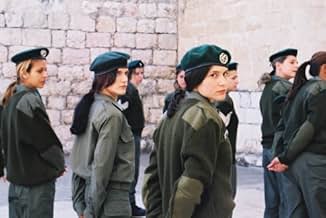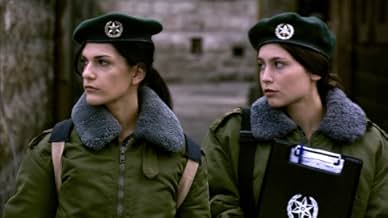Agrega una trama en tu idiomaRebellious and outgoing Smadar can't stand types like Mirit. Mirit, introverted and frightened, keeps away from the likes of Smadar. But the two are thrown together as they are assigned to a... Leer todoRebellious and outgoing Smadar can't stand types like Mirit. Mirit, introverted and frightened, keeps away from the likes of Smadar. But the two are thrown together as they are assigned to a patrol in Jerusalem as part of their compulsory military service. Their job is to stop Pa... Leer todoRebellious and outgoing Smadar can't stand types like Mirit. Mirit, introverted and frightened, keeps away from the likes of Smadar. But the two are thrown together as they are assigned to a patrol in Jerusalem as part of their compulsory military service. Their job is to stop Palestinian passersby, to ask for their identity cards, and to write down their details on s... Leer todo
- Dirección
- Guionistas
- Elenco
- Premios
- 2 premios ganados y 9 nominaciones en total
- Mirit's Mother
- (as Katia Zimbris)
- Captain Dubek's assistant
- (as Ilanit Ben Yaakov)
- Lieutenant Colonel
- (as Sharon Reginiano)
- Dirección
- Guionistas
- Todo el elenco y el equipo
- Producción, taquilla y más en IMDbPro
Opiniones destacadas
As a film this one works out rather well. The constant grim presence of danger ((suicide) terrorism) is clearly radiating from every scene. The two play convincingly enough to make the roles come alive and even though the pace of the film is rather low it stays interesting all the way through. There's always something going on, how small and insignificant it may be.
Visual effects used are down to Earth and with that a really good match with the general setting of the film. Choice of music has been done equally well and that makes for a very well worked out combination.
All in all a very enjoyable watch, if a little depressing.
8 out of 10 bored soldiers
You can't blame nice guys for being that way when they were brought up to be gentlemen and not taught how to stick up for themselves against rude, aggressive bullies (males and females) and authoritarian figures. Furthermore, if they were to talk back to their officers and sergeants about things that they saw were morally wrong, they would be court-martial for being insubordinate and disrespectful to their superiors. And then the officers,sergeants, and police supervisors would complain about their people not showing initiative or taking charge of a situation. People can't do their jobs on their own if they are always constantly be told to shut up and not do anything unless instruction to do so.
Finding the means of successfully combating terrorism has, of course, become a life-or-death necessity for the people of Israel. One of their responses to the threat has been to instigate mandatory military service for all their young people. Another has been to subject Arabs to legal random searches - simply for being Arabs. In the Israeli film, "Close to Home," Smadar and Mirit are two young Army officers whose job it is to check the ID's of anyone in their assigned area who happens to look like a Palestinian. Possibly because they have grown up with terrorism as a regular part of their lives, these girls seem to have developed a strange immunity to its effects, for neither seems overly impressed with the seriousness of the job they are doing - although, of the two, Mirit is a little more concerned about what might happen to them were they found to be in any way derelict in their duties. Smadar and Mirit are not exactly natural buddies, but, over time, they develop a certain tenuous closeness that seems sure to blossom into a full-fledged friendship by the end of the story. Or will it?
"Close to Home" is more of a naturalistic study of the day-to-day lives of these two women than it is a heavily plotted narrative. Most of the film is spent chronicling their interactions with their military superiors, the random people they are forced to interrogate, and, most importantly, each other. Smadar Sayar and Neama Shendar create believable, memorable characters who perform their task more out of a sense of duty than a fiery love of country. It's only when an explosion hits a little too close to home that they are, at least momentarily, shaken out of their lethargy. But even that doesn't last for long, as the girls begin to slack off at their jobs once again, with Smadar becoming an ever more potentially corrupting influence on the decidedly less rebellious Mirit.
If the filmmakers, Vardit Bilu and Dalia Hager, have a political point to make, it is well hidden beneath the deceptively casual surface of the girls' relationship. For this is, first and foremost, a story about Smadar and Neama, about two Israeli youngsters who, despite the extraordinary conditions under which they are forced to live, are basically interested in the same things that preoccupy young people the world over: moving away from home, pursuing romantic interests, deciding on hairstyles and fashions. If anything, the filmmakers seem to be saying that it really isn't possible for the human mind to exist in a state of constant readiness no matter how great the threat, that eventually the concerns of common everyday life will rise to the surface and crowd most everything else out. Bilu and Hager clearly acknowledge the reality of the terrorist threat, but they also know that a life ruled by fear is no life at all.
In a subtle but persuasive way, the movie also raises the extremely touchy question of just how far a nation should go in abrogating the civil liberties of any single group in exchange for increased safety. It is an issue Israel has been dealing throughout its entire existence, and the movie makers clearly acknowledge that there is no simple solution to that conundrum - a conundrum that has, unfortunately, become increasingly relevant beyond the limits of the Israeli border.
Also I liked it as it has heavy hints about the situation in Israel in recent years with Intifada 2. But the movie is Human and not Political. Filmed mainly in central Jerusalem and is realistic. You see what happens when a "Pigua" (Terror Explosion) happens. But you also see 18 year old Youngsters growing up the hard way. Directed by two Women Vardit Bilu and Dalia Hagar the movie is thru women's eyes.
Selecciones populares
Detalles
Taquilla
- Total en EE. UU. y Canadá
- USD 20,931
- Fin de semana de estreno en EE. UU. y Canadá
- USD 5,630
- 18 feb 2007
- Total a nivel mundial
- USD 67,110
Contribuir a esta página



















